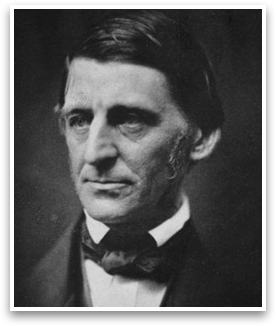
Ralph Waldo Emerson
The son of a Unitarian minister, Ralph Waldo Emerson originally attended both Harvard College and Harvard Divinity School as preparation for ordination into the Unitarian Church. Though his father, grandfather, and great-grandfather were all ministers, Emerson eventually left the church over objections regarding communition.
Rather than a minister, Emerson worked as an essayist, lecturer, and poet. His Transcendentalist philosophy, which championed the virtues of individualism, and emphasis on self-reliance would influence generations of Americans including such noted figures as Nathaniel Hawthorne, Henry David Thoreau, and John Dewey. Though his prose was at times opaque (if not outright cryptic), Emerson's philosophy both reflected and influenced the spirit of American independence, and his influence is felt even today.

Themes and Facts
- Despite leaving the Unitiarian church, its views regarding the individuality of each person's understanding of God and judgment regarding morals and ethics were formative for his more mature thought.
- He championed the virtues of individualism and non-conformity.
- The egalitarianism of the Unitarian church also informed Emerson's views on individual rights, particularly slavery, which he vehemently opposed.
- As one of the founders of the so-called Transcendentalist movement, Emerson believed in a spirituality that cannot be confined to the empirical, physical realm and must be appropriated by each individual personally.
- Emerson maintained that the Transcendentalist "resists all attempts to palm other rules and measures on the spirit than its own."
Study Questions
- Read the short poem at the beginning of Emerson's Nature. What attributes of Transcendentalism are evident there?
- What, according to Emerson, are the shortcomings of historical Christianity as articulated in his "Divinity School Address"? How accurate are Emerson's arguments?
- One defining characteristic of Transcendentalism (and, hence, Emerson) was that individuals should trust their own instinct, insight, and intuition when making important decisions. What flaws or even dangers can you see in Emerson's idea?
Essayist, poet, and philosopher Ralph Waldo Emerson embodied the brash, brave individualism that is so often identified with the American ethos.